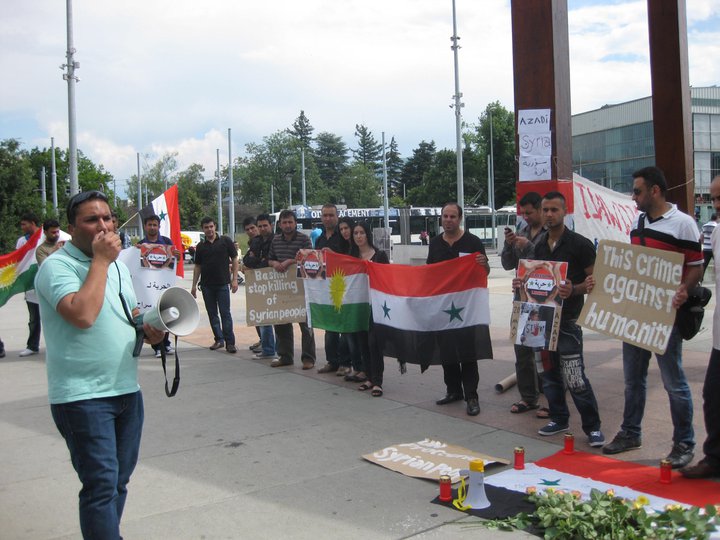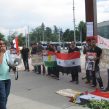
Syrian Kurds Play the Russia Card in Pursuit of Autonomy
Publication: Terrorism Monitor Volume: 10 Issue: 10
By:

The ongoing political and security crisis in Syria has provided unexpected opportunities for Syria’s Kurdish community to initiate diplomatic discussions with Russia, China and Iran in its pursuit of regional autonomy, a near impossibility under the Assad regime before the outbreak of political violence as part of last year’s “Arab Spring.”
The Partiya Karkeren Kurdistan (PKK – Kurdistan Workers Party) and its Syrian affiliate, the Partiya Yekitiya Demokrat (PYD – Democratic Union Party), Russia, Iran and China are opposed to outside intervention by the Western states or Turkey and prefer to find alternatives This has resulted in the reshaping of relations in the region.
In the past, Russia has utilized the PKK as a lever against Turkey to deter possible Turkish support for Chechen insurgents. [1] After 2008, Russia emerged as Turkey’s largest trading partner and relations improved, but now Turkey and Russia have differences over Syria. [2] For Russia, Syria is a long-term ally in the Middle-East and the naval supply station in the Syrian port of Tartus is of strategic value (see Eurasia Daily Monitor, April 19). This has caused friction in Russia’s relations with Turkey, which has abandoned its ties to Syria and now supports the removal of the Assad-government while opposing any role for the PKK and the PYD in a post-Assad Syria.
Turkey supports the Free Syrian Army (FSA) and the Syrian National Council (SNC – allegedly formed in Istanbul) and tries to pressure Massoud Barzani, the president of the Iraqi Kurdistan region, to force Syria’s Kurdish National Council (KNC) to make concessions with its Syrian counterpart and exclude the PKK from the process. It is therefore logical that the PKK and its PYD affiliate have tried to counter Turkish influence by joining the National Coordinating Body for Democratic Change in Syria (NCB). The NCB supports the Kofi Annan plan and a peaceful transition and dialogue with the regime and is against any foreign intervention (see Eurasia Daily Monitor, April 19). Therefore the NCB is a useful opposition alternative to the SNC for Russia (AL Monitor, May 8).
Due to these different interests, PYD leader Salih Muslim has said that Syrian Kurds would defend Syria as “Syrian patriots” against a Turkish intervention, while senior PKK leader Cemil Bayik claimed that Turkey wanted to target the PKK through its relations with Iran and Syria (Diekurden.de, May 10; Firat News Agency, May 5). This made some Syrian Kurds worry that the PKK is more opposed to Turkey than Assad, and this has fueled rumors of alleged PKK-Syrian cooperation, despite the fact there were clashes and tensions between the two in Aleppo in which some PYD members were killed earlier this year (DieKurden.de, March 10, May 10; Kurdwatch, February 22).
Moreover, the fact that the PYD and NCB are talking with the foreign allies of Assad does not change the fact that toppling the Assad-government will be difficult without foreign intervention. This creates suspicions among the opposition parties over the role the NCB plays in Syria. The Russian state-dominated media have also been portraying the PYD in a positive light and its delegates have visited the PKK in Aleppo (Russia Today, April 30).
Despite this, the PYD has indicated in all its statements that it still opposes the Assad regime (Roj TV 2011). Several PYD members have been killed in clashes with the regime and a number of PYD members are still in Syrian prisons. This may indicate that there is no cooperation between the PYD and Assad or that a temporary alliance is breaking down. It may also indicate that the Assad regime simply ignores PKK activities from time to time to focus its energies on the Arab opposition. [3]
However, not everyone is critical of the NCB’s-policies, and some opposition members recognize that a dialogue with Russia is necessary, given the fact that Russia as a UN Security Council member can support or veto UN motions and is also in a position to pressure Assad to make changes. The same goes for Iran and China.
Although the PYD claims its talks with the Russian government are designed to support the Annan peace plan and to force the Ba’ath-regime to end its attacks on demonstrations, in reality it wants to prevent an international intervention led by Turkey or the creation of a Turkish-supported humanitarian corridor that could lead to Turkish dominance over Kurdish areas in Syria similar to the establishment of Turkish influence in the Kurdistan region in post-invasion Iraq. [4]
Furthermore, if the NCB does succeed in creating a transitional government, the PYD would be assured of future influence in the Syrian government through the role it played with Russia and could then play a stabilizing role in a post-Assad Syria. PYD leader Salih Muslim has claimed Russia is not against a form of Kurdish autonomy in Syria (Diekurden.de, April 26).
If the Assad-regime does fall due to a civil war, the PYD can create its own “democratic autonomy.” There are already rumours that the PYD is slowly preparing to take over the Kurdish-dominated areas, and this might explain why the Assad-regime is trying to curb the PYD’s activities and attempting to arrest its members.
Thus while Turkey continues to be more isolated due to the new relations emerging between Iran, Syria and Iraq, the PKK has found more room to manoeuvre due to the current crisis between Turkey and Syria. Its collaboration with the NCB has enabled it to meet with Russian officials such as Foreign Minister Sergei Lavrov, Deputy Foreign Minister Mikhail Bogdanov and the chairman of the Duma’s international affairs committee, Aleksey Puskov, as well as various Iranian and Chinese officials (Ozgur Gundem, April 27). The Arab spring has proven to be beneficial to the PKK and has empowered the role of stateless Kurds in the region.
Wladimir van Wilgenburg studied Journalism and New Media at Leiden University and is studying international relations at the University of Utrecht. Van Wilgenburg writes freelance articles on the Middle East and is an editor at the Kurdish newspaper Rudaw, based in Erbil, northern Iraq.
Notes:
[1] Svante E. Cornell, "The Kurdish Question in Turkish Politics," ORBIS 45(1), pp.31-46, https://www.cacianalyst.org/Publications/Cornell_Orbis.htm.
[2] Sergey Markedonov and Natalya Ulchenko, "Turkey and Russia: An Evolving Relationship," Carnegie Endowment Commentary, August 19, 2011, https://carnegieendowment.org/2011/08/19/turkey-and-russia-evolving-relationship.
[3] Author’s e-mail interview with PYD foreign affairs representative Alan Semo, May 6, 2012.
[4] A document leaked by defected Ba’athist civil servant Abd al-Majid Barakat indicates the Ba’ath regime was coordinating with the PKK to ensure security around Aleppo, but PYD-supporters claim this is part of a Turkish disinformation campaign (al-Jazeera, March 20).





